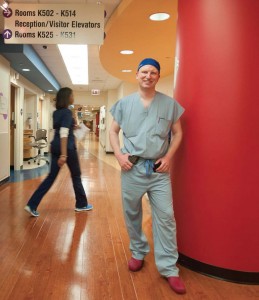
Jonathan Emerson Kohler ’94, M.D., uses more than one theater.
Many of us know and envy people who can balance work lives with serious avocations. The engineer who’s also a chef, or the investment manager who writes spy novels—somehow these people have cultivated different talents simultaneously. A few people pursue two separate careers at once.
Jonathan Kohler ’94, on the other hand, has woven two seemingly unrelated talents into a single career. He is a pediatric orthopedic surgeon who integrates story and medicine. His formula has traction and plenty of growth potential.
The power of narrative has always fascinated Jonathan. “Good, gripping stories, told through theater, movies or television, hold our interest, emotionally connect, teach us—even leave us with a skill set we didn’t have at the beginning,” he says. “I’m interested in how that happens. It’s clear that the public draws a critical perspective about medicine, among many other things, from getting involved with stories.”
Jonathan hatched his plan as a four-year-old. “My idea then was that I would be a doctor and a television actor who occasionally drove an ambulance. If you consider that I did drive an ambulance while I was at Brown, I’m still on Plan A.”
Milton experiences tripped the sense that he might actually be able to realize a plan like this.
“Sitting in Linde Eyster’s Advanced Biology class, I knew that she would have seen me the night before acting in the play,” says Jonathan. “For one of her assignments, I made my first attempt at using a story to illustrate science. I wrote a play. Peter Garran (’94) and I did a kind of gangster farce about two bacteria; it described the life cycle of bacteria.”
 Spending every spare minute in Kellner Performing Arts Center and working with faculty there set him up for success in medicine. “What I learned as a writer, actor, designer and stage manager at Milton informs everything I do as a doctor. Surgery is really about setting up a room, coordinating a group of people to execute in a highly specialized way, making sure that people with different skill sets work together to reach a result that is bigger than the sum of the parts. Calling where I work an ‘operating theater’ is no mistake.”
Spending every spare minute in Kellner Performing Arts Center and working with faculty there set him up for success in medicine. “What I learned as a writer, actor, designer and stage manager at Milton informs everything I do as a doctor. Surgery is really about setting up a room, coordinating a group of people to execute in a highly specialized way, making sure that people with different skill sets work together to reach a result that is bigger than the sum of the parts. Calling where I work an ‘operating theater’ is no mistake.”
Building on his Milton momentum during college, medical school, postgrad work and training, Jonathan kept integrating his key interests. Today, he is a fellow in pediatric and thoracic surgery at the University of Chicago’s Comer Children’s Hospital, with a typically rigorous research and clinical schedule. He is also a junior faculty scholar with Chicago’s Bucksbaum Institute for Clinical Excellence, a center devoted to finding ways to enrich the patient-doctor relationship through improved communication.
In school, out of school, between schools, Jonathan composed a potpourri of a résumé. At Brown he was a teaching assistant in several biology classes, and the general manager of the Brown Daily Herald. He worked in the theater and on many weekends he’d be at the wheel of the college ambulance. After college, in New Bedford, Massachusetts, he was healthcare reporter for a regional newspaper. He came back to Milton twice (“Kellner was as much a home to me as anywhere I’ve lived,” he said.), once as technical theater director during Dar Anastas’s sabbatical; another semester he taught a playwriting class along with technical theater. “During all of that, I tended to sleep in four or five 30- to 40-minute increments a day,” he confessed.
Jonathan’s unique CV drew one of two reactions from medical schools where he applied. One group found it a complete conundrum. Jonathan remembers others, notably at the University of Chicago, saying, “This could really be interesting. We’re not sure exactly what you’re trying to do, but we are willing to look at how using new narrative techniques might make medicine more effective. Tell us how we can help you.” Doctors at Pritzker School of Medicine were open and enthusiastic.
During his second year of medical school, Jonathan formed a theater group called “Operating Theater.” His roommate at the time was Peter Schell ’96, a comedian doing improvisation full time, and the two were taking classes together at Improv Olympic, Chicago’s well-known improv comedy training program. “Operating Theater did some improv,” Jonathan says, “in class, or in the hospital in patient rooms.” Then the group decided to do a play, Shadow Box, which had won a Tony and a Pulitzer in 1977. “We did it for an elective about death and dying. It’s based on Elisabeth Kubler-Ross’s work on the stages of dying, and it’s about families dealing with the process. The three main characters are living in a hospice facility. I first learned about this play when I did the design for Peter Parisi’s 1212 staging of it,” Jonathan says.
Sitting in the audience for Shadow Box was John Lantos, a U. Chicago pediatrician and president of the American Society for Bioethics and Humanities. Dr. Lantos asked Operating Theater to perform as a keynote element for the Society’s annual convention in Nashville. “When we did, other requests came in,” says Jonathan. “We performed at UMass and then at Milton, where we invited the Boston medical schools to see it in Kellner.”
The play’s impact on healthcare providers—as it shows real people dealing with the complexity of dying—is “proof of principle,” Jonathan says. “All of us are programmed to learn by stories. We’re standing on a pyramid—millennia of oral tradition, informed by certain moral and ethical structures, based on parables from a number of old books. Add to that, the average American spends 40 hours every week watching television or video. We’re simply primed to learn from these media, from stories. There’s no evolutionary basis for our learning from Power Point bullets.” Jonathan argues that Shadow Box works because it attaches concepts with people, and allows us to spend time with those people.
Jonathan’s work as a surgeon has come to include the consulting he does through a company he formed while doing postdoc research. His firm, RxCreative, operates in the “crosstalk,” as he calls it, between medical or science professionals and storytelling professionals (writers, directors, producers). “We help health and science professionals create compelling, creative narrative media; and we help storytelling professionals portray science and medicine on screen.”
Through RxCreative, Jonathan and his team, including his Milton roommate, physicist David Weld ’94, have had a hand in stories developed for television and movies. “I can help writers and producers because I understand ‘the story imperative,’” Jonathan says. “The story has to drive the production. It’s not hard to suggest medical or scientific outcomes that are not only accurate, but also strengthen the story.”
Jonathan is interested in the effect of popular media on people’s expectations about medicine—whether that’s managing disease or undergoing surgery or various emergency procedures (CPR, for instance). Even moderately successful shows are typically seen by six million people per week; messaging in programs has profound effects.
“People often come into the hospital with preconceived notions; their ideas and reality are often discordant,” says Jonathan. “The failure to meet their expectations causes problems, some of which you can measure and relate to outcomes,” he says. Persistent ideas like “miracles happen,” or “never give up,” or “someone must have screwed up” aren’t uniformly helpful.
Jonathan plans to stay in academic pediatric surgery after his fellowship. His track record shows the impact of stories and it has piqued interest in Chicago and other cities. Researchers contact him; his own ideas never slow down, either. For instance, the epidemic of gun violence we’re experiencing now is an apt subject. As a trauma center surgeon, Jonathan frequently operates on gunshot victims, almost every day in the summer, typically of kids caught in the crossfire. “Their families talk about living in ‘Chiraq’ (shy-raq),” he says. “We doctors need to remind ourselves about what’s happening in our patients’ lives. They might as well live in another country in the middle of a war. What if a team of actors and scriptwriters spent some time with these families? It would allow medical people an invaluable way to get in touch with their patients’ day-to-day lives.”
—CDE



